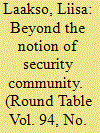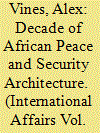|
|
|
Sort Order |
|
|
|
Items / Page
|
|
|
|
|
|
|
| Srl | Item |
| 1 |
ID:
131222


|
|
|
| 2 |
ID:
073205


|
|
|
| 3 |
ID:
119440


|
|
|
|
|
| Publication |
2013.
|
| Summary/Abstract |
This article examines how the African Union (AU) has handled Africa's peace and security challenges since 2002, defines what has been successful and what remains aspirational. It does so by examining how the AU has responded, from using sanctions against coups, to deploying peacekeeping missions and mediating in conflicts.
An African Peace and Security Architecture (APSA) has developed since 2002, including a Peace and Security Council, an African Standby Force, a Continental Early Warning System and a Panel of the Wise. This sounds impressive, but the operationalization record is patchy: AU-deployed missions have been fully dependent on external donors; harmonization is a major problem; serious questions remain over AU capacity; and some of the Regional Economic Communities (RECs) are developing at a quicker pace than the AU.
Given these circumstances and its internal capacity deficit, the AU will likely struggle to exercise oversight of regional processes, including the development of regional standby force arrangements. APSA is clearly based on a liberal peace model, yet democratic systems, respect for human rights and good governance aren't always in place in African countries, and the self-interest of elites continues to be a constraint on APSA and its success.
Over the last decade the AU has found a voice and, despite some setbacks, it has shown through AMISOM in Somalia that it is capable of conducting a successful peacemaking operation. Its biggest challenge is not making the decision to intervene or deploy forces, but the capacity of most African states to deploy effectively. APSA's dependence on external partners needs to diminish over the next decade if better African solutions are to be found to peace and security challenges in the continent. Yet, the internationalized nature of crises such as the one in Mali in 2012-13 requires international partnerships.
Not all of Africa's security problems can be solved by Africa alone, but APSA does provide a vision framework for African and external partnership.
|
|
|
|
|
|
|
|
|
|
|
|
|
|
|
|
| 4 |
ID:
172157


|
|
|
|
|
| Summary/Abstract |
Regional and sub-regional organisations in Africa play vital roles in the promotion of peace and security on the continent. The African Peace and Security Architecture (APSA) mandates certain roles for AU-recognised Regional Economic Communities (RECs), and RECs have been active in many peace and security spheres from early warning to peace missions. This article seeks to illuminate the changing landscape of regional security governance in Africa, primarily through the lens of formal peace agreements, which are important tools for ending violent conflict. Extant research does not establish the frequency and capacity of regional organisations’ engagement in peace agreements. We present original quantitative data, systematically tracing these evolving and uneven activities. Our data establishes trends of REC peace agreement engagement that vary across Africa's sub-regions during 2002–2015. We further explore patterns of organisational interaction, presenting case studies of peace processes that highlight important variation in terms of the distribution of influence and authority.
|
|
|
|
|
|
|
|
|
|
|
|
|
|
|
|
| 5 |
ID:
161125


|
|
|
|
|
| Summary/Abstract |
Since the mid-twentieth century, the East and Southern African regions have been mired in complex and overlapping security and development challenges, including ethnopolitical conflicts, terrorist insurgencies, the proliferation of small arms and light weapons (SALWs), and overwhelming economic crisis. These challenges have had implications for human security, socio-economic development, territorial authority, sovereignty and the stability and legitimacy of political regimes in the affected states. The adequacy and relevance of the regional responses to these challenges is the subject of ongoing debate, to which this paper now adds. Among other factors, this paper identifies competition for regional dominance and institutional inadequacies as accounting for the inability of regional governance bodies to respond adequately to the challenges they face. Consequently, it recommends the expansion of the mandate of the Regional Economic Communities (RECs) beyond regional economic integration to include peacebuilding and a deepening of the institutional efforts focused on security cooperation and conflict management.
|
|
|
|
|
|
|
|
|
|
|
|
|
|
|
|
|
|
|
|
|